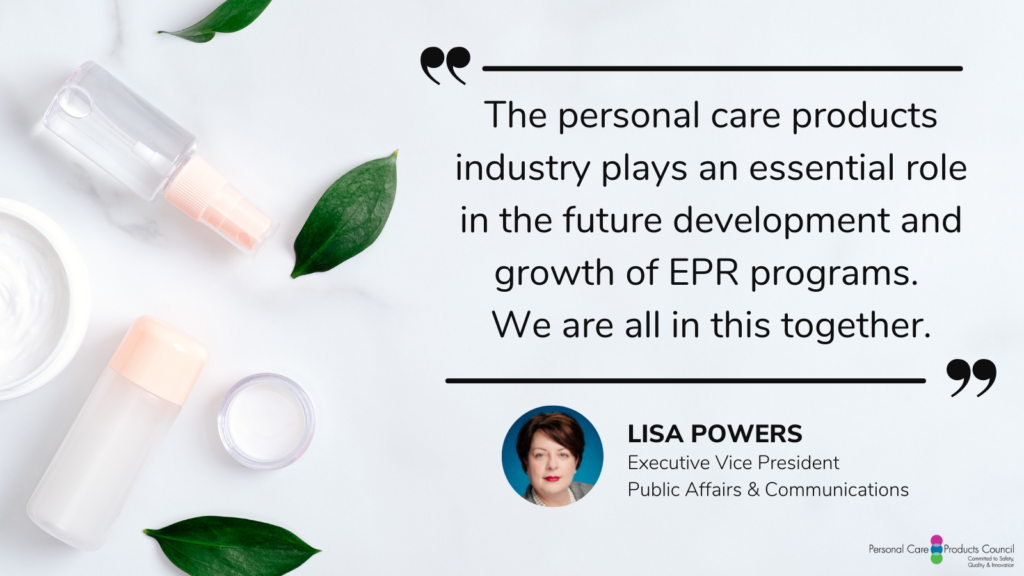Extended Producer Responsibility (EPR) – What’s the Future?
By Lisa Powers
EVP, Public Affairs & Communications
Extended Producer Responsibility, or EPR, is an innovative policy approach emerging in several U.S. states to address growing concerns about waste produced by our economy. It assigns producers the responsibility for fiscal, physical and/or end-of-life management of their products and packaging once they are no longer in use.
Last month, I moderated a webinar in PCPC’s sustainability series with a focus on EPR programs, today and in the future, with guest speakers Resa Dimino, managing partner at Signalfire Group, and Lucy Pierce, project manager at the Sustainable Packaging Coalition (SPC). Numerous PCPC companies are members of SPC.
As Dimino noted during the webinar, companies from a number of industries are engaged with state policymakers to develop effective EPR programs, focusing on:
- Increased waste diversion and recovery,
- Reduced government cost,
- Incorporated cost of recycling and end-of-life management in the product’s cost and
- Improved design of products to reduce environmental impact
In 2021, Oregon and Maine were the first states to pass EPR bills specific to packaging. In 2022, 15 states have already introduced EPR packaging legislation and more are likely. Typically, state legislation sets requirements for brand and retailer responsibility for residential recycling programs, creates performance standards (e.g., recycling rates, service standards, etc.) and establishes oversight of the programs.
But even without this legislation, EPR principles are widely used for products across various industries, including beverage containers, electronics, rechargeable batteries, paint and many other consumer products. EPR is emerging as a key consideration in the design and development for packaging of cosmetics and personal care products, even when not legislatively mandated.
Regardless of the industry, one of the most critical parts of an EPR program is the producer responsibility organization (PRO), which serves as the administrator of the legislation once implemented. The PRO manages obligations set forth in the legislation and develops and implements the program plan, which serves as the blueprint for meeting goals and obligations. In addition, the PRO sets and collects fees.
According to the Sustainable Packaging Coalition: “Many new bills and positions extend cost coverage to include outreach and education, infrastructure improvements, and end-market development for recycled materials. Organizations and policymakers are increasingly pointing to effective EPR as a necessary component of a comprehensive approach to addressing recycling challenges and concern over single-use product pollution.”
In June 2021, PCPC members were among the more than 100 companies to sign on to a statement from the Ellen MacArthur Foundation committed to ensuring their company and its actions align with the principles of a circular economy while also “advocating for the establishment of well-designed EPR policies and being supportive in working out how to implement and continuously improve EPR schemes in the local context.”
PCPC supports state EPR programs that embrace the following principles:
- Shared Responsibility – costs and reduction targets should be shared between producers,
municipalities and other value chain actors - Prioritize Infrastructure – producer funding should be directed towards infrastructure that
will increase packaging recovery and circular use - Transparency and Accountability – adequate reporting, monitoring and
independent auditing systems should ensure producer compliance, state
accountability of administrative costs and the overall financial health of the program - Producer Access to Materials – producers should have fair and privileged access to the purchase of recycled materials in support of closed-loop recycling

PCPC recognizes the need for all actors along the packaging value chain to help identify options to contribute to the success of state initiatives to enhance recycling and support the circular economy. All stakeholders, including the personal care products industry, play an essential role in the future development and growth of EPR programs. We are all in this together.
